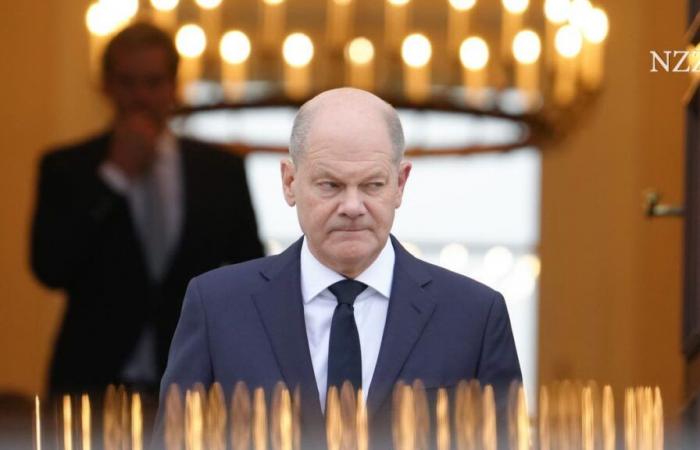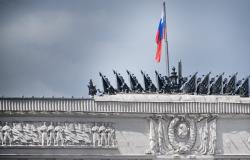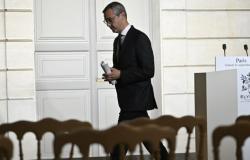The German Chancellor is actually asking the question of trust in order to remain able to act. But some chancellors appointed them so that the Bundestag would overthrow them and there would be new elections.
In January, Chancellor Olaf Scholz wants to ask the vote of confidence.
Kay Nietfeld/DPA
On Wednesday, incumbent German Chancellor Olaf Scholz announced that he wanted to ask the Bundestag for a vote of confidence in January 2025. A look at history shows what this means.
In theory, the question of trust is very simple: the Chancellor asks Parliament whether it supports his policy. The Bundestag then meets and strengthens the Chancellor’s position and expresses its confidence in him. Or he will overthrow him.
The fathers of the Basic Law wrote the vote of confidence into the constitution so that the incumbent government remains able to act in a crisis or is replaced by a new one.
If a chancellor loses the vote of confidence, he can request the Federal President to dissolve the Bundestag and thus hold new elections.
However, the history of the Federal Republic has shown that the question of trust is also an interesting instrument for clever power politicians. If the polls of your own party are favorable, the vote of confidence can be a useful vehicle to gain a solid majority and peace in parliament.
Since the founding of the Federal Republic, four Chancellors have asked for a vote of confidence. One of them even twice.
1972 – Willy Brandt and the “sell-out of German interests”
At the beginning of the 1970s, one topic had a decisive influence on politics in the Federal Republic: the relationship with the socialist East. The social-liberal coalition under Chancellor Willy Brandt dared to do something new: it focused on rapprochement.
In the so-called Eastern Treaties that the Federal Republic concluded with the USSR and Poland, it officially recognized the Oder-Neisse border with Poland for the first time. De facto this meant: the government gave up the former German eastern territories. The criticism of Brandt was severe. The CDU spoke of a “sell-out of German interests”.
At home in Germany, the opposition accused him of “selling out German interests.” Federal Chancellor Willy Brandt received a lot of international recognition for his Eastern policy and the fall of Warsaw.
Bettmann / Getty
Internationally, however, Brandt received a lot of support. On December 7, 1970, he knelt in front of the Monument to the Heroes of the Warsaw Ghetto. The world watched and saw it as a great gesture: it wasn’t just a Federal Chancellor kneeling, the whole of Germany was asking for forgiveness for the horrors of National Socialism. A year later, Brandt received the Nobel Peace Prize.
In the Federal Republic, however, the conflict between the government and the opposition came to a head. The bourgeois-conservative wing of the FDP broke away from the coalition with the SPD. The CDU politician Rainer Barzel then launched a constructive vote of no confidence in the Bundestag. The attempt to overthrow Willy Brandt failed.
At that time, the government and opposition formed two equally strong, opposing blocs. The opposition opposed the government’s budget plan and the government continued to pursue rapprochement with the East. The result was a blockage.
Brandt saw a way out: on September 20th he asked the Bundestag a vote of confidence and lost. The Chancellor was happy about this defeat.
The Federal President called for new elections. With a record high voter turnout of 91.1 percent, the SPD won the elections with 45.8 percent. The social-liberal coalition now had a solid majority in the Bundestag. Willy Brandt’s calculations worked.
1982 for the first – Helmut Schmidt, his comrades and the FDP
Brandt’s successor, Chancellor Helmut Schmidt, was confronted with several crises at the beginning of the 1980s: As a result of the Islamic revolution in Iran, crude oil prices rose in Western countries. In addition, sales in the steel industry collapsed and exports from the German economy also fell. The great years of the economic miracle were over. And geopolitically, the Cold War had heated up dangerously.
In 1977, the Soviet Union renewed its nuclear arsenal. Many of these rockets were aimed at West Germany. Chancellor Schmidt urged the West to follow suit. Two years later, NATO members agreed on the “double decision”. The West should also modernize its arsenal and create a “balance of terror” to prevent the impending nuclear war.
In response, a peace movement was formed in the Federal Republic that protested against the NATO double decision and Helmut Schmidt. The highlight: In the fall of 1981, 300,000 demonstrators gathered in Bonn’s Hofgarten.
In the fall of 1981, 300,000 people demonstrated in Bonn’s Hofgarten against the NATO double decision and its initiator: Federal Chancellor Helmut Schmidt.
Sven Simon / Imago
The left wing of the SPD increasingly moved closer to the peace movement and increased the pressure on its Chancellor Helmut Schmidt. The working climate also deteriorated within the social-liberal coalition.
In addition, FDP chairman Hans-Dietrich Genscher called for cuts in social benefits and a liberalization of economic and social policy in response to the economic situation. Genscher spoke of the end of the “entitlement mentality”. The left-wing SPD base and the trade unions opposed this. Helmut Schmidt threatened to be wiped out between the demands of the FDP and his own party. He wanted to ensure unity within his party and the coalition and reacted. On February 5, 1982, he asked the Bundestag a vote of confidence.
Although Schmidt won the vote, tensions with the FDP intensified. Just a few months later, in the fall of 1982, the CDU, with votes from the FDP, overthrew Chancellor Schmidt with a constructive vote of no confidence. Instead, they elected the Christian Democrat Helmut Kohl as the new chancellor.
1982 for the second time – Helmut Kohl and the solid parliamentary majority
He had a problem right at the beginning of his first term as Chancellor: the Bundestag had elected him without new elections. The balance of power in parliament remained as it was under his predecessor. Chancellor Kohl lacked legitimacy, but not opponents in the Bundestag.
Similar to Willy Brandt, Kohl wanted to lose the vote of confidence in order to force new elections. The timing seemed good for this because the surveys predicted a clear election victory for the Union and FDP.
However, critics accused Kohl of abusing the instrument of trust. The fathers of the Basic Law did not intend it for power political maneuvers.
Chancellor Helmut Kohl receives his first congratulations after the constructive vote of no confidence against Helmut Schmidt.
Imago
Kohl did not allow himself to be deterred and declared that he was in the worst economic and financial crisis since the Federal Republic was founded. The government needs a “decisive voter mandate”. The case went to the Federal Constitutional Court, which, however, subsequently supported Kohl.
Kohl lost the vote on the vote of confidence after a four-hour debate. But he clearly won the following new elections on March 6, 1983. The effort was worth it.
2001 – Gerhard Schröder, trust and war
It took almost twenty years before a Federal Chancellor asked the vote of confidence again. On November 16, 2001, Chancellor Gerhard Schröder appeared before the Bundestag, asked the question of confidence and, for the first time in history, linked it to a specific question.
Shortly after the terrorist attacks of September 11, 2001, Schröder assured the American government of Germany’s unlimited solidarity. After the UN approved military intervention in Afghanistan, the Bundeswehr took part in this military operation.
However, any deployment of the Bundeswehr outside NATO territory requires the approval of the Bundestag. The Federal Constitutional Court decided this in a ruling in 1994.
Before the vote on the vote of confidence, Chancellor Gerhard Schröder spoke of the support he needed. His critics saw this as “blackmail”.
Thomas Koehler / Imago
MPs from the red-green coalition, of all people, criticized Schröder. Because they had to decide on the question of trust and the Bundeswehr deployment at the same time, they felt under pressure. Some spoke of “blackmail”.
Schröder described the Bundeswehr deployment as a turning point. He argued that for such a decision he would need not only a parliamentary majority, but also the support of the coalition.
Of 662 MPs, 336 voted yes and 326 voted no.
2005 – Gerhard Schröder gambles away
Just four years later, in the early summer of 2005, Schröder asked the question of trust again. The government was in crisis again.
At the end of May, the voters of North Rhine-Westphalia voted out the last red-green state government. On the evening of the state elections, Schröder declared that he wanted new elections. Schröder, just like Brandt and Kohl before him, wanted to lose the vote on the vote of confidence and strengthen his position in the Bundestag through new elections.
With Agenda 2010, Schröder tried to reform the German social system and the labor market. This is because at the beginning of the 21st century the Federal Republic at times had more than 5 million unemployed people. Economists spoke of the “sick man of Europe”.
Schröder’s reforms drove tens of thousands onto the streets. In particular, the introduction of unemployment benefit II, better known as Hartz IV, triggered a wave of protests. In numerous cities, people gathered for Monday demonstrations and deliberately alluded to the protests on the eve of the fall of the Berlin Wall, which always took place on Mondays.
Across the Federal Republic, people took to the streets on Mondays against Schröder’s reforms. They consciously wanted to build on the spirit of 1989.
Imago
Representatives of both government parties, the SPD and the Greens, publicly opposed Schröder. They denied that Schröder’s plan, i.e. to lose the vote of confidence in a calculated manner, was permissible. As in the days of Brandt and Kohl, they did so without success.
Angela Merkel, then opposition leader, explicitly supported Schröder’s plan. After Schröder lost the vote of confidence and the subsequent elections, Merkel was elected the first female chancellor.






